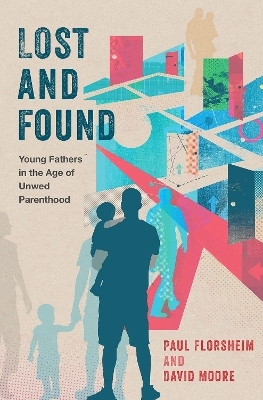
Lost and Found
Oxford University Press Inc (Verlag)
978-0-19-086501-6 (ISBN)
Over the past six decades, there have been dramatic changes in the dynamics of family life in the United States. Today, about seven out of 10 babies born to mothers under the age of 25 will not live with their fathers. From the perspective of many social scientists and politicians, this change has wreaked havoc on society, trapping women and children in poverty and loosening the civilizing bond between men and their families. Gallons of ink have been spilled making arguments that place the blame for this shift at the feet of either these individuals themselves, or point to eroding family and cultural values or systemic failures in social support programs. This book, however, is different: the goal of Lost and Found is not to look for blame, but instead to tell the stories of young men becoming fathers, to help readers understand the complexity of young couples who are struggling to work together as parents, sometimes successfully and sometimes not.
Drawing from their research with over 1,000 young parents in Chicago and Salt Lake City, Paul Florsheim and David Moore focus on a group of about 20 young fathers whose stories--conveyed in their own words--help the reader make sense of what is happening to fatherhood in America. Having interviewed young fathers and their partners before and after their children were born, these stories provide a dynamic perspective on the development of young men and their relationships. Young mothers both corroborate and sometimes offer alternative or contradictory perspectives. Oriented to undo stereotypes, Florsheim and Moore introduce the notion of "good enough" fathering, tempering the tendency to think simply in terms of good or bad fathers. Throughout, the authors draw from a wide body of scholarship, from evolutionary biology to the economics of women's rights, to explain how young fathers came to occupy such a precarious position in contemporary society. In the final chapters, Florsheim and Moore provide concrete recommendations for strengthening fathers' roles, offering detailed descriptions of what can be done to help young fathers and mothers create stable home environments for their children, whether the parents are together or not.
Paul Florsheim, PhD, MA, is a Professor in the Joseph J. Zilber School of Public Health at the University of Wisconsin-Milwaukee, where he continues to work with young fathers and their families. Trained as a clinical psychologist, Dr. Florsheim's primary research interests include the interpersonal developmental processes across the transition to parenthood and the prevention and treatment of mental illness in adolescents. His research on young families has been supported by grants from National Institutes of Health, the Office of Population Affairs, and the Robert Wood Johnson Foundation. David Moore, PhD, MS, is a Professor of Psychology at the University of Puget Sound. Dr. Moore has authored multiple publications in the areas of teen parenting, adolescent and adult development, and romantic relationships. In addition to teaching and conducting research, Dr. Moore maintains a private clinical practice specializing in psychotherapy with individuals as well as both married and unmarried couples.
Preface
Part 1. Fatherhood Begins
Ch. 1. A Tale of Two Fathers
Ch. 2. The Problem with Young Fatherhood
Ch. 3. Dads and Cads: The Sociobiological Roots of Fatherhood
Ch. 4. Fathers at the Crossroads
Part 2. Fathers in the Age of Unwed Parenthood
Ch. 5. Is This Love?
Ch. 6. Birth Control Anyone?
Ch. 7. Are Fathers Necessary?
Ch. 8. Are Fathers Disappearing?
Part 3. Fathers Lost
Ch. 9. What Goes Wrong?
Ch. 10. Love and Injury
Ch. 11. Drowning Sorrows
Ch. 12. Bad Seeds or Bad Soil?
Ch. 13. Broken Hearts
Ch. 14. The Epidemiology of Heartbreak
Part 4. The Good Enough Father
Ch. 15. What is a "Good" Father?
Ch. 16. The Next Top Model (of Fatherhood)
Ch. 17. The Impact of Fathers on Children
Ch. 18. Good-Enough Fathers
Part 5. Fathers Found: The Development of Good-Enough Fathers
Ch. 19. The Father-Child Bond
Ch. 20. You Got to Really Want It (or at Least Convince Yourself that You Do)
Ch. 21. On Becoming a Dad: Hormonal Changes and Good Enough Fathers
Ch. 22. Fathers are Found in Relationships
Part 6. Finding Fatherhood
Ch. 23. Fatherhood Programs: A Short History of Trial and Failure
Ch. 24. Co-Parenting Support: Prenatal Care and the Window of Opportunity
Ch. 25. A Compass and a Map: Helping Young Fathers and Their Families
| Erscheinungsdatum | 05.02.2020 |
|---|---|
| Verlagsort | New York |
| Sprache | englisch |
| Maße | 239 x 165 mm |
| Gewicht | 703 g |
| Themenwelt | Studium ► Querschnittsbereiche ► Prävention / Gesundheitsförderung |
| Sozialwissenschaften ► Pädagogik ► Sozialpädagogik | |
| Sozialwissenschaften ► Soziologie ► Mikrosoziologie | |
| ISBN-10 | 0-19-086501-6 / 0190865016 |
| ISBN-13 | 978-0-19-086501-6 / 9780190865016 |
| Zustand | Neuware |
| Informationen gemäß Produktsicherheitsverordnung (GPSR) | |
| Haben Sie eine Frage zum Produkt? |
aus dem Bereich


